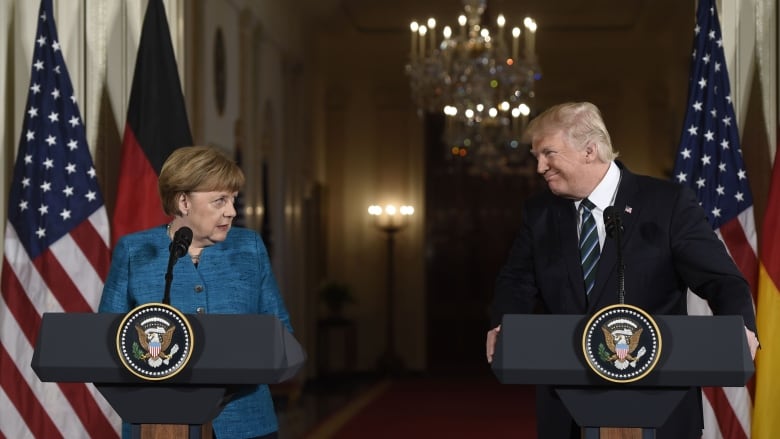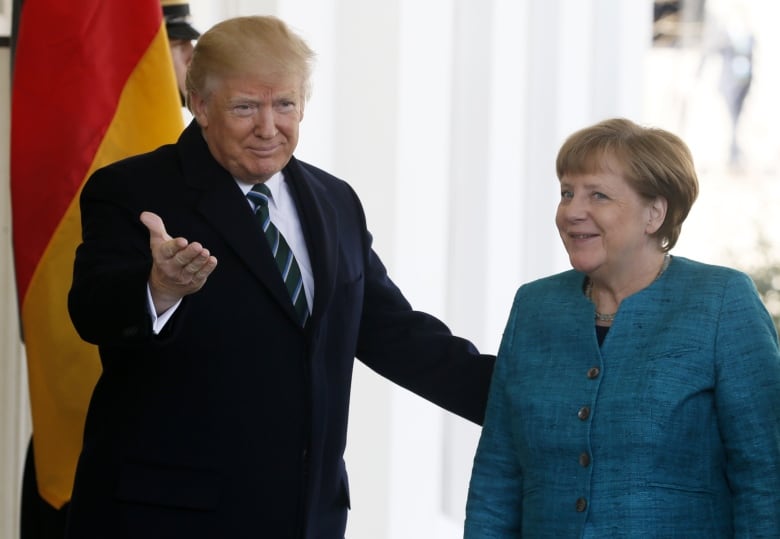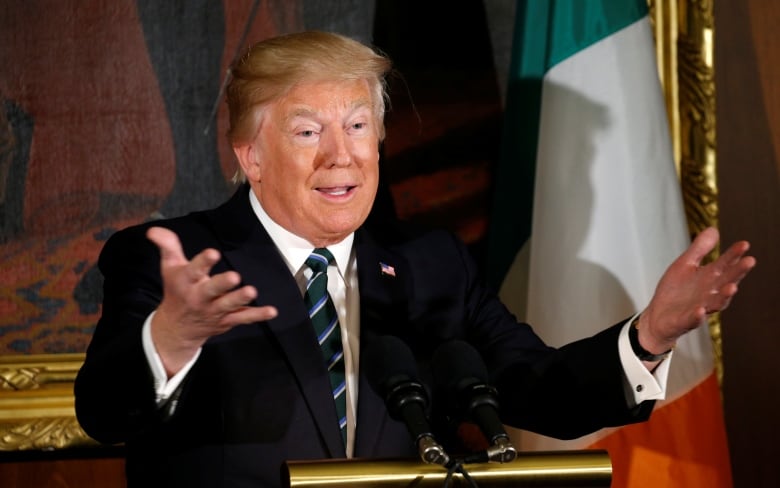Trump, Merkel struggle to find common ground in White House visit
On campaign trail, Trump had accused Merkel of 'ruining' Germany for allowing an influx of refugees

Though presenting a study in contrasts, U.S. President Donald Trump and German Chancellor Angela Merkel took a similar tack Friday in sidestepping differences after their first meeting at the White House. Trump asserted with a smile they had at least one thing in common: being wiretapped by the Obama administration.
- ANALYSIS | Among 'last defenders' of liberal world order, Merkel does the heavy lifting
- Trudeau says Canada one of NATO's 'strongest actors' without committing more money
Trump, the celebrity real estate developer and former reality television star, repeated his contention that former president Barack Obama may have tapped his phones in Trump Tower. He sought to turn the explosive charge into a light joke when asked about concerns raised by the British government that the White House is now citing a debunked claim that U.K. spies snooped on Trump.
"At least we have something in common, perhaps," Trump said casually, referring to 2013 reports that the U.S. was monitoring Merkel's cellphone conversations. As for the most recent report, Trump said he shouldn't be blamed for quoting a Fox News analyst who had accused British intelligence of helping Obama spy on him. The German chancellor maintained her composure during the awkward diplomatic moment.
When a German reporter asked Trump if he regrets any of his commentary on Twitter, Trump said, "Very seldom."
On another subject, Trump also pushed back against the notion in Europe that his "America First" agenda means he's an isolationist, responding firmly, "I don't believe in an isolationist policy." The president appeared to bristle at the suggestion from a German reporter, adding, "I don't know what newspaper you're reading, but I guess that would be another example of, as you say, fake news."
Merkel often attempted to project a more conciliatory approach, saying she and Trump had not yet had much time to discuss economic issues. She said the "success of Germans has always been one where the German success is one side of the coin and the other side of the coin has been European unity and European integration. That's something of which I'm deeply convinced."

Those comments appeared aimed at making a case to Trump on the benefits of the European Union. Trump backed Britain's departure from the EU and has expressed skepticism of multilateral trade agreements.
The two leaders tried to express their common bonds but showed minimal rapport in their first encounter, a departure from Merkel's warm relations with Obama during his eight years as president. During a photo op in the Oval Office, the two did not shake hands before reporters. At the start of the news conference, Merkel sought to break the ice, saying that it was "much better to talk to one another than about one another."
The.<br><br>Looks.<br><br>On.<br><br>Their.<br><br>Faces.<br><br>Merkel: “Do you want to have a handshake?”<br><br>Trump: [crickets. scene.] <a href="https://t.co/LLFxuyGDY0">pic.twitter.com/LLFxuyGDY0</a>
—@BraddJaffyMerkel said delicately that while she represents German interests, Trump "stands up for, as is right, American interests. That is our task respectively." She said they were "trying to address also those areas where we disagree but tried to bring people together."
"We need to be fair with each other," Merkel said, saying both countries were expecting "that something good comes out of it for their own people."
The meetings at the White House included discussions on strengthening NATO, fighting the Islamic State group, the conflict in Afghanistan and resolving Ukraine's conflict, all matters that require close co-operation between the U.S. and Germany.
Trump previously slammed, praised Merkel
Their sit-down could be a restart of a relationship complicated by Trump's rhetoric on the campaign trail.
Trump spent much of 2016 bashing the chancellor, accusing her of "ruining" Germany for allowing an influx of refugees from Syria.
"You watch what happens to Angela Merkel, who I always thought of as a very good leader until she did this. I don't know what went wrong with her," said then candidate Trump at an August rally in Virginia. "What went wrong? Angela, what happened?"

On the campaign trail, Trump seemed to care little about the potentially awkward ramifications were he to win. He invoked Merkel as a foil at his rallies, accusing his campaign rival, Hillary Clinton, of wanting to be "America's Angela Merkel." He lashed out at Time magazine when it named Merkel "Person of the Year" in 2015 instead of him.
Still, Trump found ways to voice his respect. When a television station in September asked him to name a world leader he admired, he cited Merkel.
In his meetings with world leaders since the inauguration, Trump has adopted a more diplomatic public persona.
He recently spent a weekend bonding with Japanese Prime Minister Shinzo Abe, golfing and dining with Abe at his Mar-a-Lago estate in Florida. He has cultivated a closer friendship with Israeli Prime Minister Benjamin Netanyahu, whom he has known for years.

But Merkel is used to an altogether different type of American leader, having shared a strong bond with former president Barack Obama. She was the last of Obama's key European allies still in power when he left office. And as the leader of Europe's biggest economy and most stable government, Merkel emerged in recent years as the leading voice for a continent struggling with slow growth, identity issues and increased security threats after a string of terrorist attacks.
Merkel's first major encounter with Trump comes as she seeks a fourth term as chancellor in elections later this year. She has acknowledged the contest could be difficult and has stressed a need for stability after Britain's decision to leave the European Union.

She reportedly has studied Trump's speeches and policies in advance of her trip, eager to find areas for co-operation. Steven Keil, a fellow with The German Marshall Fund of the United States, said Merkel has little reason to dwell on Trump's past comments
"Merkel is extremely pragmatic in her approach here, but she's also going to have some situations in which it will be tough for her to give too much," Keil said.
Trump has rattled European leaders with his "America First" mantra. He also backed Brexit and is skeptical of multilateral trade agreements. Merkel is expected to reiterate her belief that a strong EU remains in America's strategic and economic interests, a message she shared last month in Munich with Vice-President Mike Pence.
